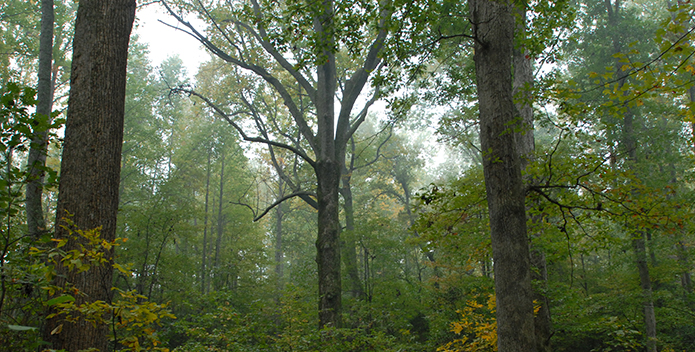A bird flying around the Chesapeake Bay watershed at 1,000 feet would see a variety of landscapes. Cities. Suburbs. Farms. But of all the landscapes, forest is the best land cover for water quality. From capturing and filtering out pollution before it enters our waterways to alleviating flooding by stabilizing the soil, trees provide countless health, economic, and environmental benefits.
But we are losing our forests at an alarming rate throughout the watershed. This includes Maryland, which, in 2018, lost the equivalent of nearly 2,000 football fields of forest to development. Which is why, with your support, we are working to pass a comprehensive package of legislation that would make tremendous strides in protecting Maryland's forests. These bills include commissioning a study of the current state of forest policy, redefining the definition of "no net loss of forest" in the current state policy goal, and addressing several issues related to the Forest Conservation Act's Fee-In-Lieu program.
We can't sit on the sidelines while this precious resource is squandered. Marylanders, take action now—urge your legislators to support this important package of legislation for the sake of Maryland's forests and waters!
We also need non-Marylanders to raise your voice for the Bay! With Virginia and Pennsylvania legislative sessions in full swing, stay tuned for opportunities to urge your legislators to move policy forward that advances our goal of leaving a legacy of clean water to future generations.
This Week in the Watershed: Official Amphibians, Baltimore Air, and Rocky Rockfish
- Fishery managers are considering catch reductions for the striped bass, also known as rockfish, following a new assessment of the stock's health. (Bay Journal) BONUS: CBF Press Statement
- The city of Hampton, Virginia is using an innovative new tool, Environmental Impact Bonds, to address the city's onslaught of polluted runoff and alleviate flooding. (Chesapeake Bay Magazine).
- Legislation to dredge oyster shell from Maryland's Man-O-War shoal is under debate, with CBF and other environmental groups arguing to not dredge the critical habitat. (Star Democrat—MD)
- Baltimore's City Council is moving forward with plans to reduce emissions from the Wheelabrator trash incinerator, the city's single largest source of air pollution. (Baltimore Sun—MD)
- The Eastern hellbender took a significant step in the quest to designate it as Pennsylvania's official state amphibian. What's the story behind this unique critter? (Penn Live—PA) BONUS: Learn more about the hellbender campaign!
What's Happening around the Watershed?
January 12-February 11
- Throughout Virginia: Help restore the health of the Chesapeake Bay and Virginia's rivers by participating in CBF's Grasses for the Masses program. Participants grow wild celery, a type of underwater grass, in their homes for 10-12 weeks. After 10-12 weeks of grow-out, participants will gather to plant their grasses in select local rivers to bolster grass populations and help restore the Bay. With workshops held throughout Virginia, there's plenty of opportunity to get involved. Find a workshop near you!
February 12
- Virginia Beach, VA: Join us for our next installment of our Brock Environmental Learning Series, as we dive into caring for your yard and practices that can save the Bay, your back, and your wallet. Reserve your spot now!
February 21
- Baltimore, MD: Join us for the second film in Docs on the Docks film series, featuring the award-winning documentary Trash Dance. This film highlights the unseen men and women who pick up our trash. Immediately following the viewing, an expert panel will discuss the film and encourage participants to advocate for change in their communities, city, and watershed. Register here!
March 14
- Newport News, VA: As more local oyster farms are producing oysters, join us to indulge in some this beloved bivalve and learn more about this growing industry from a local oyster farmer. Learn more and register here!
March 19
- Richmond, VA: As more local oyster farms are producing oysters, join us to indulge in some this beloved bivalve and learn more about this growing industry from a local oyster farmer. Learn more and register here!

Issues in this Post
Forest Loss Advocacy Conservation Habitat Loss Land Use Politics Runoff Pollution Smart Growth Sprawl Trees Water Quality CBF in Maryland CBF in Virginia Eastern Shore Office CBF at the Federal Level Hampton Roads Office Maryland Office, Annapolis CBF in Pennsylvania Virginia Office, Richmond



